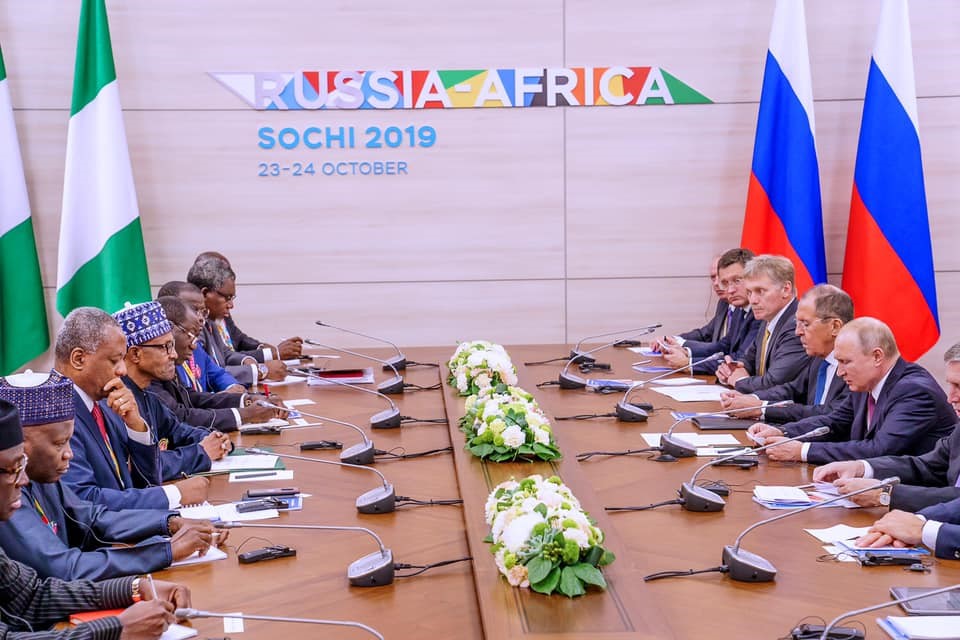There are no products in your shopping cart.
| 0 Items | £0.00 |

 NIGERIA and Russia have reached an agreement to resuscitate the moribund Ajaokuta Steel Rolling Mill in Kogi State after leaders of the two nations signed a deal on the project on the sidelines of the ongoing Russia-Africa Summit.
NIGERIA and Russia have reached an agreement to resuscitate the moribund Ajaokuta Steel Rolling Mill in Kogi State after leaders of the two nations signed a deal on the project on the sidelines of the ongoing Russia-Africa Summit.
Yesterday, the Russia-Africa Summit kicked off in the southern city of Kochi, with Nigeria leading a delegation of 40 African countries to the event. Co-chaired by President Abdel el-Sisi of Egypt, the current chairman of the African Union, the summit is focusing on the exploration and expansion of opportunities in security, trade and investment, science and technology and gas production.
On the sidelines of the conference, Nigeria and Russia held a bilateral summit during which the two sides agreed on a range of matters, including steel production. Ajaokuta Steel Mill was inaugurated by the then Soviet Union in 1979 but the project has simply refused to get off the ground as at the moment, three-quarters of the complex have been abandoned and only the light mills have been put into operation for small-scale fabrication and the production of iron rods.
After several failed attempts at privatisation, the Nigerian government took back control of the facility in 2016 but the mill had still not produced a single sheet of steel by December 2017. After much expense, its light mills were finally put into operation in 2018 for small-scale fabrication and the production of iron rods but the bulk of the facility remains derelict, including the large-scale equipment and the internal railway.
In a bid to revive the mill, which is central to any Nigerian industrialisation plans, the government has asked Russia to come and resume control of the facility. Other than that, they also agreed to start new infrastructure projects and expand trade and investment, as well as strengthen security and military cooperation.
Nigeria and Russia will also work together to improve the efficiency of Nigeria’s oil sector, which will see to rehabilitation of the oil refineries through a joint venture between Nigerian National Petroleum Corporation (NNPC) and Russia's Lukoil. Both NNPC and Lukoil will work towards prospection of oil in deep offshore and the two countries have also agreed to revive and solidify the venture between the NNPC and Russia’s gas giant Gazprom for the development of Nigeria’s enormous gas potential and infrastructure.
Russia's government has also agreed to support the development of Nigeria’s rail infrastructure by constructing 1,400 kilometres track from Lagos to Calabar. There was also discussion on the advancement of an ongoing project for the establishment of a nuclear power plant in Nigeria.
On security and military cooperation, President Buhari agreed to renew the Nigeria-Russia Military Technical Agreement. This military cooperation agreement is expected to enhance the direct procurement of military hardware on a government-to-government basis at low costs.
President Putin also agreed to support the training of military personnel and modernisation of infrastructure and equipment. In addition, President Buhari asked Russia to support Nigeria’s aspiration for permanent membership of the United Nations Security Council.
On the Aluminium Smelter Company of Nigeria, Ikot-Abasi, Akwa-Ibom State, President Buhari said he had asked the Nigerian justice ministry to submit a comprehensive report on the Russian owners UC Russel. In addition, the two countries also addressed a partnership in education and agriculture.
President Buhari said: “We seek your government’s support especially in the areas of wheat production. Today, Nigeria produces less than 100,000 tonnes of wheat locally while our imports are projected to exceed 5m tonnes in 2020, so we, therefore, need your support to bridge the deficit which will create jobs and save our foreign exchange for other important areas like security, defence and infrastructure.”
In agriculture, President Putin said Nigeria should take advantage of Russia’s potassium resources to advance local fertiliser production. He promised his country’s support for the geological prospection of Nigeria’s solid minerals and gave assurances of working with Nigeria and other African countries to stop the incidents of piracy in the Gulf of Guinea.